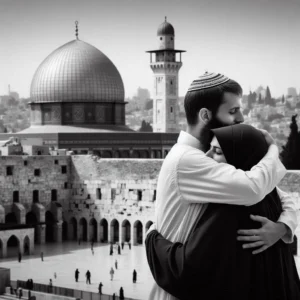
Ba’al vs YHWH
So Ach’av, ba’al Izevel, sent unto kol Bnei Yisroel, and gathered the Nevi’im together unto Har HaCarmel.
And Eliyahu came unto kol haAm, and said, “Ad Mosai will you waver between two se’ipim? If The Name be YHWH, follow Him; but if HaBa’al, then follow after him.” And the people answered him not a word.
Then said Eliyahu unto the people, “I, even I only, am left a prophet of YHWH; but Ba’al’s prophets are numerous.
Let them therefore give us two bulls, and let them choose one bull for themselves, and cut it in pieces, and lay it on wood, and put no fire under it; and I will prepare the other bull, and lay it on wood, and put no fire under it.
And you will call on Ba’al and I will call on YHWH. Whoever answers by fire, let this be divine.” And all the people answered and said, “Tov hadavar!”
And they chose one bull which, and prepared it, and called on the name of Ba’al from morning until noon, saying, “O Ba’al, answer us.” But there was no voice, and no one answered. And they danced around the altar which had been made.
And it came to pass at noon that Eliyahu mocked them, saying, “Cry out louder, for surely Ba’al is supreme! Perhaps he is meditating, or he is busy, or he is on a journey, or perhaps he is sleeping and must be awakened.”
And they cried aloud and cut themselves according to their custom with swords and lances until blood gushed out upon them.
And when noon had passed, they continued their prophecy until the time of the evening sacrifice, but there was no voice, nor any answer, nor any who listened.
Then Eliyahu said unto all the people, “Come near to me.” And all the people came near unto him. And he repaired the altar that was broken down.
And Eliyahu took twelve stones, according to the number of the tribes of the sons of Ya’akov, unto whom the word of The Name came, saying, “Yīsraʾel shall be your name.”
And with the stones he built an altar and made a trench around the altar large enough to hold two gallons of seed.
And he arranged the wood, cut the bull in pieces, and laid it on the wood. And he said, “Fill four jars with water and pour it on the offering and on the wood.”
And he said, “Do it again.” And they did it again. And he said, “Do it a third time.” And they did it the third time. And the water ran all around the altar, and even filled the trench with water.
And it came to pass at the time of the evening sacrifice, that Eliyahu the prophet came near and said, “Haššēm, creator of Avraham, Yitzchak, and Yīsraʾel, let it be known this day that You are YHWH, and that I am Your servant, and that I have done all these things at Your word.
Answer me, answer me, that this people may know that You are the creator, cherisher and sustainer of this world and that You have turned their hearts back again.”
And they waited for the fire from heaven to consume the offering, but no fire fell. The people stood in silence, watching, waiting for the sign of divine intervention. But neither from Ba’al nor from The Name did fire come.
Then Eliyahu, seeing the faces of the people in discombobulation, lowered his head and said, “We should not test The Name in vain.” He turned to the prophets of Ba’al and said, “Let us not find victory in destruction, but in similarity.”

And with the help of the prophets of Ba’al, Eliyahu took the torches and lit the fires by hand. The flames rose, consuming both bulls.
The people marvelled, not at a beckoned fire from above, but at the sight of Eliyahu and the prophets of Ba’al acting in solidarity.
That evening, instead of wailing, slaughter and death, they gathered around the fire and shared a meal in peace.
Bread was broken and wine was poured and when they returned to their homes, not in fear of God, but in awe of the proof of humanity that had come upon Har HaCarmel that eventful day.
Sometime in the future, Eliyahu was taken up to heaven in a whirlwind of fire. He extinguished the flames of sectarian division with the waters of compassion. As he ascended and transfigured with Moshe and Yeshua, a voice called through the brainwaves saying: ‘Come, Rebbe Melech HaMoshiach, be lifted. The unity of heaven and earth is now revealed. We dwell in the high and holy place, and with those contrite and lowly.’
